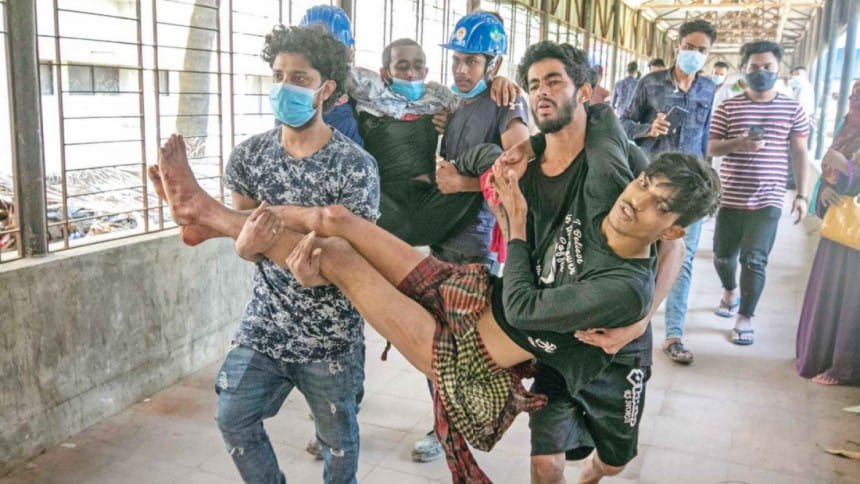Banshkhali Police Firing: Treatment cost weighs heavily on the injured

Workers who were shot during police firing at the SS Power I Plant in Chattogram's Banshkhali have had their bullets removed surgically, but that has not signified an end to their struggles.
Survivors of the shooting, which took place on April 17 when workers of the power plant owned by S Alam Group were protesting over unpaid salary and unhygienic accommodation, are now worried about their long-term treatment costs.
At least seven workers died and 15 others were injured during the Banshkhali power plant shooting.
Five workers died on the spot and two others succumbed to injuries at Chattogram Medical College Hospital (CMCH) and Parkview Hospital in the port city.
Around 11 workers with gunshot wounds admitted at the CMCH have had the bullets removed, said Surgeon Jamir.
Habib Ullah, 24, of Gondamara, had a bullet in his lower abdomen. He told The Daily Star that the bullet was removed from his body on April 18.
On April 17, when he went to work at the power plant, several workers said they would demand their salaries in arrears.
"When the clash broke out, I was in the toilet. I was shot the moment I stepped out of the toilet," he said.
Habib's father Rafique told The Daily Star that he had received Tk 50,000 from S Alam Group. But he has already bought medication worth Tk 65,000.
"I'm a farmer with little income. How would I be able to continue [bearing] the treatment cost? I don't know," a frustrated Rafique told The Daily Star.
Habib said his son would need 12 bags of blood, but he does not know how to manage it.
Aminul Haque, 27, is another bullet-hit worker undergoing treatment at ward 24. From Bahubol upazila, Habiganj, Aminual was a mason at the plant.
His elder brother Mominul Haque told The Daily Star that he learnt that his brother got shot around 11:00am on April 17.
"Doctors removed a bullet from his lower abdomen. But his condition is still critical. He will need 22 bags of blood. We have spent around TK 70,000 as of Thursday and don't know how much more will be needed in the coming days," he added.
This correspondent talked to Md Rahat and Abu Sayed, both of whom sustained bullet wounds in the shooting.
Doctors removed two bullets from Abu Sayed and one from Md Rahat. They have spent similar sums of money for treatment.
Md Rahat, who hails from Hatiya upazila and worked at the plant as a crane operator, told The Daily Star that he was shot while in his room at the plant.
"I have no savings and four family members back in Hatiya to feed. How would I bear the cost of medical treatment and support my family?" Rahat asked.
Surgeon Jamir said, "We kept them in observation as it will take time for their bullet wounds to heal."

 For all latest news, follow The Daily Star's Google News channel.
For all latest news, follow The Daily Star's Google News channel. 



Comments